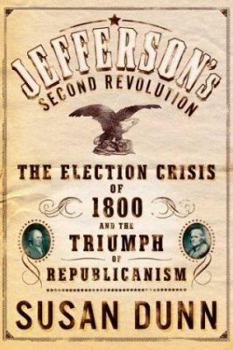Jefferson's Second Revolution: The Election Crisis of 1800 and the Triumph of Republicanism
Select Format
Select Condition 
Book Overview
The election of 1800 was a revolution in the modern sense of a radical new beginning, but it was also a revolution in the sense of a return to the point of origin, to the principles of 1776.... This description may be from another edition of this product.
Format:Hardcover
Language:English
ISBN:0618131647
ISBN13:9780618131648
Release Date:January 2004
Publisher:Houghton Mifflin
Length:372 Pages
Weight:1.58 lbs.
Dimensions:1.2" x 6.4" x 9.4"
Customer Reviews
1 rating
Elitism finally overturned
Published by Thriftbooks.com User , 17 years ago
It is recognized that the standing of the common man, especially artisans and farmers, rose with the American Revolution, yet all through the 1780s, social elites were troubled by the unruly, irresponsible governance often practiced under the Articles of Confederation. It is they who engineered the formation of the reactionary US Constitution, which severely checked the power of majorities to easily and quickly influence government. The first government of the new United States was drawn heavily from the elite strata, who came to be known as the Federalists. They contended that the average American should not be concerned with governing - it was beyond their capability. As the author indicates, the election of 1800 was a transforming shift of power from the Federalists to Jefferson's and Madison's Republicans; in addition, it became quite evident that only through political parties could effective political opposition be orchestrated. The Federalists actually did not regard themselves as a party, per se; they were simply the rightful governing element of society. Political parties were viewed as undesirable factions, though capable of being neutralized by the existence of many such factions. The creation of Democratic-Republican societies as a reaction to the Jay Treaty of 1794, which was viewed by many as a cave-in to the British, was highly troublesome to Washington, Hamilton, et al. Just who were these unruly, ignorant men who dared to challenge their wisdom and leadership? Many of these societies viewed the French Revolution with favor, which simply added fuel to the notion that they were out to undermine the US government. Out of these societies the Republican Party gradually emerged. When war with France over the harassment of American merchant shippers in 1798 became a real possibility, the Federalists passed the Alien and Sedition Acts to officially suppress criticism of the government, ignoring the passage of the First Amendment less than ten years prior. As the election of 1800 approached and it became obvious that the Federalists were out, there was a great fear that a party that looked to average Americans would undermine the social stability of the US when taking power. Jefferson was subjected to incredible denunciation. Actually the leading Republicans were from the same social backgrounds as the Federalists. Despite the inflammatory rhetoric, the election of 1800 became perhaps the first peaceful transfer of power in a nation via elections that had ever occurred in world history. From that point, gaining political power in the US has been a continual contest involving the organizing impetus of political parties. The Republicans gained tremendous ascendancy over the first two decades of the 19th century, becoming one-party rulers. But that proved to be an unstable situation resulting in a split, becoming Jackson's Democrats and Clay's Whigs. The book is a readily understandable account of the dichotomous political views of the






